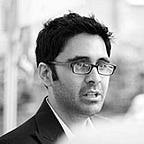The Myth of Prometheus
The Spark and the Gift
Maybe you know the myth of Prometheus. He stole fire from the gods, and gave humans the gift of the spark.
So the gods, angered, lashed him to a rock, to have his liver eternally pecked away by birds of prey.
Every myth contains a great and perfect truth. Few more so than this. But it isn’t the one we think.
Modernity gives Prometheus a shallow interpretation. The gift of fire enabled men and women to create technologies. From the hearth to the engine to the nuclear plant. But technology itself is the great crime stealing the power of the gods.
Is it? Why would the gods care that you and I have little gadgets? They have thunder and ocean. iPhones don’t threaten the gods. You can’t Google map your way to mount Olympus, you can’t find Persephone or Aphrodite on Tinder.
This empty interpretation makes little sense, and teaches us nothing at all. It is just a reflection of the reductive material rationalism that modernity holds up as its gods.
The true lesson of Prometheus is this.
The fire was a divine spark. It was the possession of the gods alone. This divine spark alone frees beings. Not to “make things”, to forge swords. But to will, dream, act, imagine, create, challenge, love.
The spark is eternal. Therefore, it is uncaused, uncreated, beginningless, endless. Zeus did not call the spark into being, the spark called Zeus into being. The spark is what made gods liberated beings, with true freedom.
Men and women didn’t have the spark. And yet it belonged to all beings, just as it does now. By bringing them the spark, Prometheus freed them. To be greater than the gods. How?
Not in terms of power. But in freedom. To do what only the gods couldn’t even really do. Challenge, defy, imagine, hope, wonder, create, love.
Without the spark, men and women were empty things, hollow beings, automatons, at the whim and mercy of the gods. And now they were not. Suddenly, they were something new: fully human.
To be human was in a way greater still than the gods. Because humans were fragile, mortal, weak. But to be fully human? All those were the wellsprings of endless strength, gentle courage, fierce gratitude, true mercy, great love. All the things the harsh and merciless gods did not have, even though they had the spark, because strength without weakness is cruelty, just as weakness without strength is vengeance.
That is why the gods grew angry. Suddenly, humans had possibility. Greater possibilities than they did. Freedom is greater than power, isn’t it?
What is the lesson in this great myth? We make the choice is every moment, don’t we? To take the spark from on high, and give it to people. To create, imagine, forgive, challenge, love. To really expand their possibilities.
When we make that choice, we are acting with courage, wisdom, beauty, grace. Risking sure suffering for a chance at really living.
The gods will always sentence us to be lashed to the rocks. That means: our inner beliefs, our ego, our sense of selfishness, will always condemn us for giving the spark of possibility away. Why should anyone else have it, share it, this power of freedom? That thought will torment us forever, if we let it.
But that is the struggle that gives the gift great purpose. The spark is there to illuminate what is truest in each and every one of us. If we don’t steal it, there is no suffering. We stay machines, slaves, but can never become truly free. And that is the truest emptiness of all.
And so the price may seek great. But the gift is greater. Possibility contains more than suffering, doesn’t it? Prometheus is there, the birds feasting. Does he suffer? Why should he? He gave birth to the world.
There is joy even in his suffering. And that is what is only possible for humans, not gods.
We make the choice in every moment. To steal the spark of possibility from on high, and light the fire of creation, or let the gods keep it, and just be automatons, machines with little freedom, empty minds following directions. That is safer, easier. But it is also failing to live. We can’t find joy even in our suffering this way.
Our real challenge is Prometheus’ great lesson: making the truest choice.
Umair
Philadelphia
August 2016
